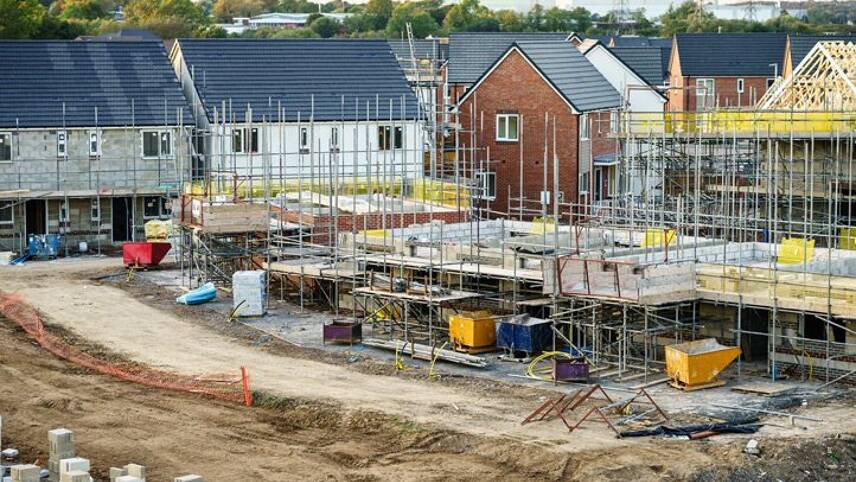Register for free and continue reading
Join our growing army of changemakers and get unlimited access to our premium content

The whitepaper confirms that MPs will respond to the consultation on the Future Homes Standard this autumn
Jenrick has today (6 August) published a new whitepaper, outlining the biggest revamp to planning processes in more than 10 years. Under the new proposals, carbon emissions from new homes are expected to be 75 to 80% lower than current levels by 2025. As the grid continues to decarbonise, the Government expects the houses to be able to perform at zero-carbon levels “without the need for further costly retrofitting work”.
“Our complex planning system has been a barrier to building the homes people need; it takes seven years to agree local housing plans and five years just to get a spade in the ground,” Jenrick said.
“These once in a generation reforms will lay the foundations for a brighter future, providing more homes for young people and creating better quality neighbourhoods and homes across the country. We will cut red tape, but not standards, placing a higher regard on quality, design and the environment than ever before. Planning decisions will be simple and transparent, with local democracy at the heart of the process.”
The built environment sector is regarded as one of the UK’s hardest-to-abate sectors, accounting for around 40% of national annual energy consumption and 33% of national annual emissions.
The whitepaper confirms that MPs will respond to the consultation on the Future Homes Standard this autumn. With the National Infrastructure Strategy (NIS) and energy whitepaper due for publication during the same period, the UK is shaping up responses to its net-zero commitment and calls for the green recovery.
The Future Homes Standard is currently under consultation and is due to come into effect in the latter half of 2020, covering England only. In its current form, it includes a headline goal to reduce the carbon intensity of new builds by 75% by 2025, which ministers plan to deliver through fresh mandates for housebuilders on triple glazing, low-carbon heating systems, onsite renewable generation and energy-efficient building fabrics. The 75% target is down from an initial proposal of 80%.
The paper hints that the 2025 date for the Future Homes Standard could be moved forward to “ensure that implementation takes place to the shortest possible timeline”.
However, the Plan has already faced a number of questions from housebuilders and green groups, concerned that it won’t fit in with the ambitions of the Government’s 25-Year Environment Plan to leave the environment in a better state than we found it.
Earlier this year, in an open letter coordinated by the UK Green Building Council (UKGBC) and sent to the Secretary of State at the Ministry of Housing, Communities and Local Government (MHCLG), local authority leaders called for the freedom to set energy efficiency standards that are above national proposals.
A group of leading architects and engineers said proposed policy changes would collectively result in a “step backwards, in a climate where we need a huge leap forward”. Environmental campaigners including Greenpeace and Friends of the Earth have also urged for broader and more rapid policy action that gives local authorities greater power.
Environmental concern
In response to the new proposals outlined today, a host of environmental groups are warning that the reforms could contribute to a loss of nature. Representatives from Wildlife and Countryside Link, CPRE, Friends of the Earth and others are calling for environmental rules to be maintained and strengthened to ensure that streamlined planning doesn’t lead to a rollback on environmental standards.
The groups argue that the planning system isn’t the main cause of delays in housebuilding, with 90% of applications approved by local planning authorities. Poor design proposals and unclear government guidance are instead hindering development, the groups argue.
CPRE’s deputy chief executive Tom Fyans said: “The key acid test for the planning reforms is community involvement and on first reading, it’s still not clear how this will work under a zoning system. Although we welcome the government’s commitment to all areas having a local plan in place, we also need robust legal guarantees that the public is consulted regarding new development.
“Red lines on a map are not going to build trust in the planning system. As things stand, the government seems to have conflated digitalising planning with democratic planning – they’re not the same thing.”
The groups are calling on the Government to ensure that the new planning system invests in ecological survey and data and mapping of habitat, ensures more ecologists and environmental planners work in Local Authorities and sets out clear rules to prevent low-quality applications by developers.
Friends of the Earth’s senior planner Kate Gordon added: “These planning reforms are bad news for our communities, climate, and local democracy. A robust planning system is essential to deal with the housing, nature and climate crises we face, so we can emerge from the pandemic in a green and fairer way.
“Weakening the system will only benefit developers because it will mean building where developers can maximise their profit, rather than what communities need. These proposals are a developers charter that bypasses the democratic wishes of communities and threatens a wave of poorly-built, badly-sited developments.”
Matt Mace


Please login or Register to leave a comment.